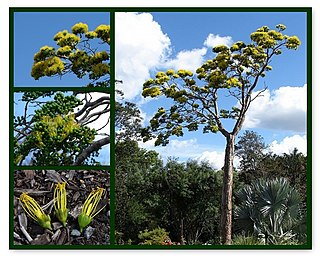
Delonix is a genus of flowering plants in the family Fabaceae, subfamily Caesalpinioideae. It contains trees that are native to Madagascar and East Africa. By far the best known species is the Royal Poinciana.

Delonix regia is a species of flowering plant in the bean family Fabaceae, subfamily Caesalpinioideae native to Madagascar. It is noted for its fern-like leaves and flamboyant display of orange-red flowers over summer. In many tropical parts of the world it is grown as an ornamental tree and in English it is given the name royal poinciana, flamboyant, flame of the forest, or flame tree.

Yucca elata is a perennial plant, with common names that include soaptree, soaptree yucca, soapweed, and palmella. It is native to southwestern North America, in the Sonoran Desert and Chihuahuan Desert in the United States, southern Nevada, southwestern Utah, and northern Mexico. Yucca elata is widely distributed, although its population appears to be decreasing.

Dreissena is a genus of small freshwater mussels in the family Dreissenidae. The exact taxonomy of the species within the genus Dreissena is, however, uncertain.

Colvillea racemosa is a species of legume in the family Fabaceae. It is also known by the common name Colville's Glory. Its genus is named for Sir Charles Colville, an ex Governor of Mauritius. The tree is particularly known for its bright orange flowers that grow in large cone or cylinder shaped clusters. After flowering, the tree produces long, flat, woody seed pods. The tree has small deep green leaves, superficially similar to Delonix regia.
Delonix baccal is a species of leguminous tree in the family Fabaceae. It is found in Ethiopia, Kenya, and Somalia.
Delonix boiviniana is a species of plant in the family Fabaceae. It is found only in Madagascar.
Delonix brachycarpa is a species of plant in the family Fabaceae. It is found only in Madagascar.

Delonix decaryi is a species of plant in the family Fabaceae. It is found only in Madagascar.

Delonix floribunda is a species of plant in the family Fabaceae. It is found only in Madagascar.
Delonix pumila is a species of flowering plant in the family Fabaceae. It is endemic to Madagascar.
Delonix tomentosa is a species of flowering plant in the family Fabaceae. It is endemic to Madagascar, where it is known only from the type specimen collected over 100 years ago. It has not been seen since and may be extinct.
Delonix velutina is a species of plant in the family Fabaceae. It is found only in Madagascar.

Pericopsis elata is a species of flowering plant in the family Fabaceae and is known by the common names African teak, afromosia, afrormosia, kokrodua and assamela.
Chusquea elata is a species of grass in the family Poaceae. This bamboo is endemic to Ecuador.
The Point of Rocks tryonia, scientific name Tryonia elata, is a species of freshwater snail, an aquatic gastropod mollusk in the family Hydrobiidae.
Manilkara elata, also called the cow tree, is a species of plant in the family Sapotaceae. It is Endemic to the Amazon region in Brazil, where it is endangered by habitat loss.

Palicourea is a plant genus in the family Rubiaceae. It contains about 200 species, which range from shrubs to small trees, and is distributed throughout the New World tropics.

Palicourea elata, formerly Psychotria elata, commonly known as girlfriend kiss and labios de puta, is a tropical plant that ranges from Central to South American rain forests in countries such as Mexico, Costa Rica, Ecuador, Panama, and Colombia. Palicourea elata is extremely sensitive and requires specific climates to grow, those climates most like rainforests are best suitable for this plant. It is most notable for its distinctly shaped red bracts and is consequently nicknamed “Hot Lips”. Though the bright red bracts are considered its most flashy feature, they are not the actual flowers of the plant but instead extravagant leaves; the flowers of Palicourea elata lie within the “red lip” leaves. Just like human lips, the hot lips plant comes in a variety of shapes and forms offering a vast array of plants. P. elata is well-studied and has been documented over centuries to provide various health benefits to native communities. Due to these benefits and the overall appearance of the plant, it has been over-harvested and is now endangered.

Opuntia elata is a species of cactus found in Bolivia, Paraguay, southern Brazil, northern Argentina, and Uruguay.












